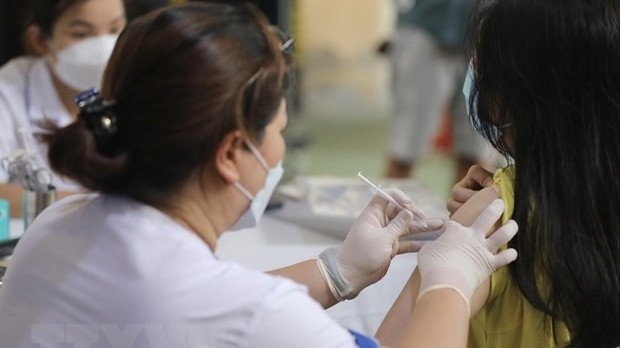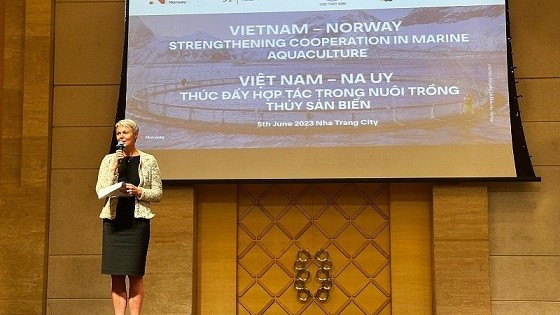
Norway Ambassador: Viet Nam has good strategies to response COVID-19
Latest
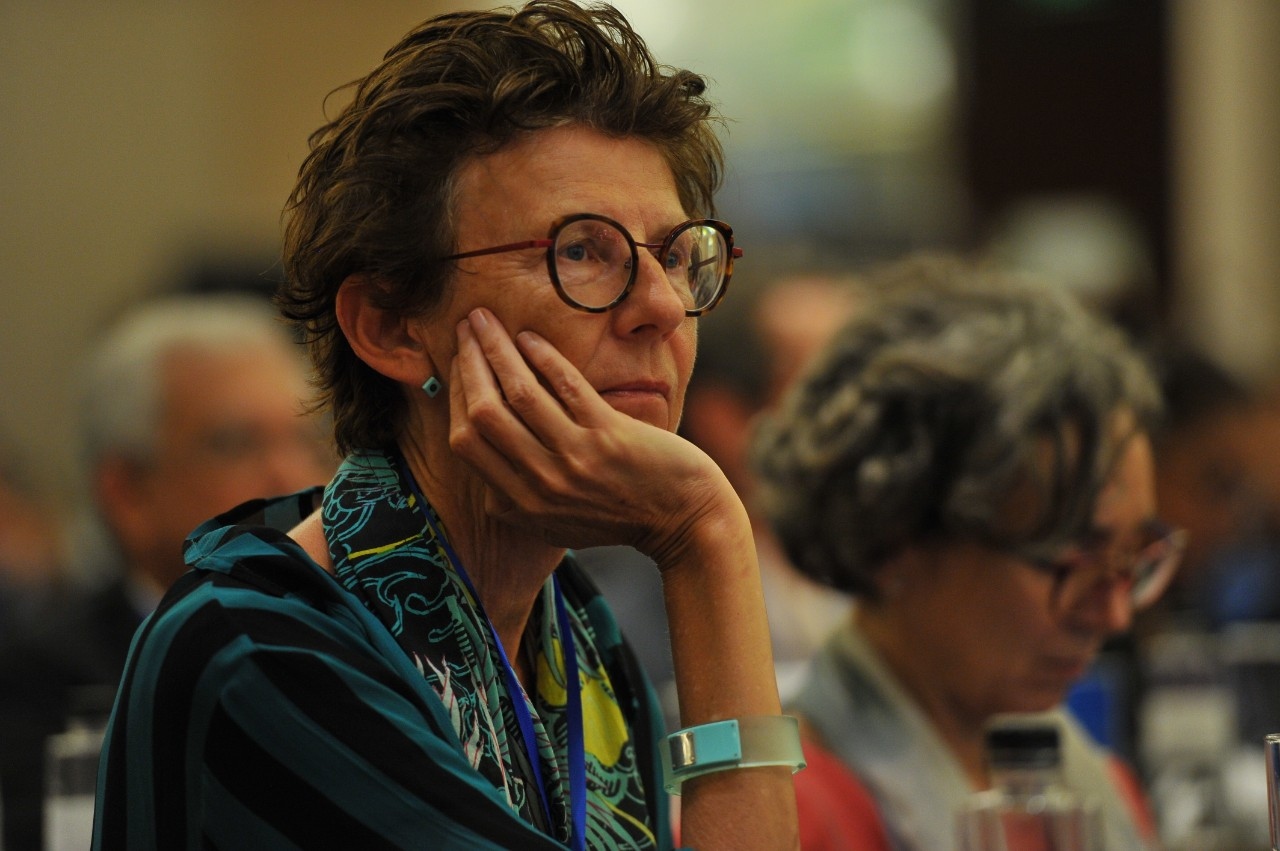 |
| Norway Ambassador to Viet Nam Grete Lochen. (Photo: Norway Embassy) |
International media has been reporting that the COVID-19 situation in Norway is getting better and Norway is considering re-opening of borders. Can you share with us Norway’s experiences in the COVID-19 control which you think can be useful for Viet Nam?
Thank you for the interview. Indeed, the last year and a half have been very tough for the entire world due to the COVID-19 pandemic. When I wrote my article last April about the COVID-19 situation, there were only 2 million infection cases reported worldwide. This number has gone up to nearly 200 million now.
Like Viet Nam, Norway acted quickly to limit the virus from spreading domestically, and limit infection from abroad while increasing health service capacity.
The policy-making process has been focusing on three key targets: limiting disease spread, mitigating economic effects and engaging with the psychosocial consequences.
In particular, young people and students who have mainly been doing online learning since last year have been struggling with isolation and its effect on their mental health.
When the new school year starts in August a key priority is, therefore, to keep schools and universities open for as many normal activities as possible.
The policies have evolved over time. Different measures are being tightened or eased depending on the pandemic situation nationally and internationally as well as the outbreaks in different local communities.
The capital Oslo and some of the surrounding municipalities have been the hardest hit by the pandemic and therefore had the strictest measures in the country over time.
Adopting a differentiated approach to be able to manage local outbreaks has been quite successful with national health authorities giving advice and constantly updating guidelines and regulations.
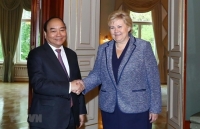
| Norway – Viet Nam’s important partner in Northern Europe: PM Viet Nam always attaches importance to developing the traditional friendship and multi-faceted cooperation with Norway – the country’s important partner in Northern Europe, Vietnamese Prime Minister ... |
In local communities with a high number of infection cases, local authorities have encouraged home offices as much as possible and arrange for digital meetings and events.
As an example, the Ministry of Foreign Affairs in Oslo has primarily been run from home offices since March 2020 with a very limited physical presence of staff in the Ministry.
In August, the Ministry will open up again for a more normal physical presence of staff due to the improvement of the COVID-19 situation in Oslo and that a high number of its inhabitants are now vaccinated.
From the COVID-19 outbreak in Norway in March last year, the Government presented policies to limit and delay it. Regulations ranged from advice on avoiding infection, testing and tracing, different quarantine measures, closure of cafeterias, restaurants, pubs and shops through advice against international travel, and limiting possible entries to Norway for foreigners.
Although Norway is not an EU member, there has been close cooperation and coordination with other European countries in these matters. The same applies to vaccine policies, developing digital vaccine passports and opening up for international travel again.
The Norwegian vaccine strategy, in general, has been to prioritize the elderly and those with underlying health conditions as well as health workers. These groups are now more or less fully vaccinated.
We have seen that the majority of COVID-19 deaths and seriously ill cases is related to the elderly and those with underlying conditions. That’s why they have been the first to be vaccinated in Norway.
A shortage of vaccines underlines the importance of the Government has a clear but flexible national vaccine strategy targeting vulnerable groups as well as the most affected areas of COVID-19. These days we’re encouraging younger people to get vaccinated since the infection rate in this age group is increasing.
Although many are not getting seriously ill, just having mild symptoms, they risk spreading the virus to more vulnerable groups. With the Delta variant of the virus now dominating in Norway, mass vaccination is key to contain the pandemic not just in Norway but worldwide.
Another set of governmental policies are related to the economic impact of the COVID-19 pandemic and the consequences for businesses, especially in the service and transport sectors, such as hotels, restaurants, tourist industry, aviation etc.
A hard-hit sector has also been the cultural sector with tough restrictions, even ban on performances, festivals and concerts for a long time. Slowly this is gradually opening up again this summer.
For many and especially the SMEs, however, it has been a devastating year economically despite several economic packages that the Government introduced to buttress both employers and employees and support specific industries heavily impacted by the pandemic.
Most recently, concerns about the psychosocial cost of the prolonged social distancing measures and the need to mitigate the consequences have shaped policies relating to the easing of social distancing procedures.
This attention to the psychosocial aspects is important because the long-term and negative effects on the younger generation dropping out of the educational system and work-life could be very serious both for the individual as well as the nation.
As in most countries, people are tired of the pandemic, even exhausted, longing to get back to their normal life again. The challenge is to strike the right balance between containment and opening up.
Fortunately, we have much more knowledge and experience now than in March last year, but we need to be humble and admit there are no quick fixes to the pandemic.
Like other Nordic countries, Norway has a publicly financed national healthcare system providing universal coverage for all residents financed through general taxation. To cope with COVID-19 in the long run, testing and vaccination are key.
The focus today is on implementing the vaccination programme. 33% of the population is now fully vaccinated while 65% has got one shot of vaccine. There is little opposition to vaccination in Norway. 90% of persons being offered vaccine have accepted it. This bodes well for developing herd immunity in the population.
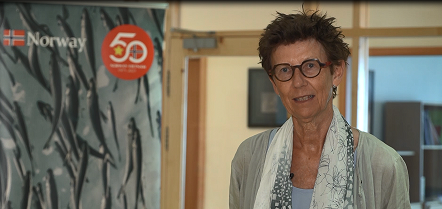 |
| Viet Nam should be commended for how they have been able to contain the COVID-19 pandemic for a long time with impressive low numbers of infected people as well as deaths. (Photo: Norway Embassy) |
As the situation of COVID-19 in Viet Nam is getting more complicated, do you have any advice for Viet Nam in the fight and control of the epidemic?
First of all, Viet Nam should be commended for how they have been able to contain the pandemic for a long time with impressive low numbers of infected people as well as deaths. In many ways, Norway has been following Viet Nam in recognizing the importance of testing and tracking of people.
Today, vaccination is very important with the more contagious Delta variant dominating also in Viet Nam. It helps build herd immunity.
From the very outset, Norway saw the importance of developing, producing and distributing COVID-19 vaccines worldwide as a key priority. We have emphasized the importance of fair and equitable distribution and access to vaccines for all countries. Emerging variants of the virus are heightening uncertainty and underscoring the need for an effective global response.
Therefore, Norway’s total contribution to the ACT Accelerator exceeds 500 million USD. The ACT Accelerator was set up in March 2020 to support the development and equitable distribution of tests, treatments and vaccines needed to fight the COVID-19 pandemic.
COVAX, the global initiative to ensure rapid and equitable access to COVID-19 vaccines for all countries, is the vaccine pillar of the ACT-Accelerator, which South Africa and Norway are co-chairing. Viet Nam is also benefitting from the COVAX mechanism. Vaccines through COVAX have been critical for Viet Nam in its vaccination campaign.
We all know that vaccines offer hope, but it is more important to ensure equitable access to vaccines, and that vaccines also reach the poorest and most vulnerable groups. The COVID-19 pandemic affects girls, boys, women and men differently. Therefore, a gender-sensitive response to the pandemic is crucial. It is essential to ensure that our actions are non-discriminating. Only then can we ensure that no one is left behind.
Unfortunately, the global demand outstrips vaccine supply which is also affecting the availability of vaccines in Viet Nam. Hopefully, we will see more vaccines arriving in Viet Nam in the second half of the year.
What do you think about the meaning, the role of “vaccine diplomacy” in the current context of the complicated situation of COVID-19? What are the implications of the “humanity” and “spill-over” effect of the “vaccine diplomacy” policy?
I would rather focus on the importance of international solidarity to fight the pandemic. It is all about sharing. The pandemic has shown how dependent we are on each other, and that we are stronger together.
Global challenges need global solutions, to quote my Prime Minister, Ms. Erna Solberg. We believe that investing in fighting the COVID-19 pandemic together is not only the ethically right thing to do but also the smart thing to do.
As mentioned above Norway has been very active in leading the effort to ensure that the global activities to fight the COVID-19 pandemic are as effective and efficient as possible. However, the pace is too slow, and global collaboration must now focus on increasing the accessibility and production capacity of vaccines. In addition to funding through COVAX, Norway has also offered almost a third of its allocation of COVAX vaccines to poorer countries.
Viet Nam has also been a responsible international partner by sharing your experiences, resources and providing medical services, equipment and treatments to other countries as well as contributing USD 500,000 to the COVAX facility.
The Vietnamese government has had a consistent voice in multilateral fora, such as the United Nations (UN) to call for international solidarity and cooperation in fighting the pandemic. In the pandemic context, every single act of sharing is very much needed and appreciated.
This virus crosses borders. The pandemic is not local. International solidarity is key in fighting the COVID-19 pandemic.
Living and working in Viet Nam, what do you perceive as the spirit of solidarity of the Vietnamese people in the COVID-19 time? Can you share with us the most impressive stories of this?
The pandemic poses unprecedented challenges to our nations, with its devastating impacts on the lives and livelihoods of people, and severe disruptions to our societies and economies. However, it also inspires many heart-touching stories about how people treat each other regardless of nationality and language boundaries.
I have been impressed by how Vietnamese health workers and other front liners have been rushing to affected areas to assist in fighting the pandemic, leaving their own families and friends and working grueling shifts. It tells a lot about the strength of the Vietnamese people. No one would forget the story about Vietnamese doctors fighting hard for 100 days to save the life of the British pilot last March. This patient No.91 has caught the headlines of not only local but also international media.
And the most recent story happened in June 2021 when Viet Nam, at the UN request, for the first time Viet Nam received and treated a COVID-19 patient who works for the UN under the MEDEVAC scheme, marking the good cooperation between Viet Nam and the UN.
This story has touched the hearts of not only UN staff regionally but also foreigners and diplomats in Viet Nam like me. It is a symbol of Viet Nam's goodwill and international solidarity, which is extremely important in these harsh times.





